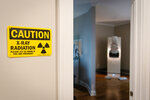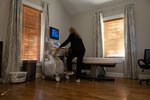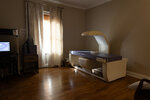In observance of Breast Cancer Awareness Month this October, Women's Imaging Specialists is urging individuals to prioritize early detection by scheduling a mammogram.
Every year in the United …
This item is available in full to subscribers.
Please log in to continue |






In observance of Breast Cancer Awareness Month this October, Women's Imaging Specialists is urging individuals to prioritize early detection by scheduling a mammogram.
Every year in the United States, around 240,000 cases of breast cancer are diagnosed in women and around 2,100 in men. According to the Centers for Disease Control and Prevention, 42,000 women and 500 men in the U.S. die from breast cancer every year.
Lillian Horak, provider relations representative for Alabama Women's Imaging Specialist, stressed early screenings and the importance of getting checked for breast cancer.
"National Breast Cancer Awareness month is also a time that we want to celebrate people who have won that battle with breast cancer and honor those who did not," Horak said.
Horak noted that one of the biggest misconceptions of why women delay having a mammogram is the fear of pain.
"During a mammogram, compression is used to help spread out that breast tissue," Horak said. "This allows our radiologists to see through that tissue and to take any kind of abnormalities. For some women, they feel no pain or discomfort."
Women's Imaging Specialists, located in Fairhope and Foley, wants to ensure their patients have a pleasant and calm experience. Horak explained that each of their facilities have been curated to be warm, calm and inviting.
"Our technology is state of the art," she said. "We include the use of patent design comfort paddles that allow that compression to be spread more evenly, providing patients with a more comfortable exam."
Horak explained that some individuals think mammograms are dangerous because of high exposure to radiation.
"I can't stress enough that mammograms are safe. The amount of radiation that is used in that tool that we use is highly regulated by the FDA and the American College of Radiology," she said.
The radiation that is used during a mammogram is low. The Women's Imaging Specialists public relations director added that the benefits of getting a mammogram outweigh any potential risk that is associated with exposure from radiation. She compared the amount of exposure that a person receives during a mammogram to the same exposure one would receive if they took a flight from New York City to Los Angeles.
She said some women might believe that if they do not experience any kind of breast issues or feeling, they do not need to get a mammogram. Horak denied this and said that is far from the truth.
"With breast cancer, there are oftentimes no symptoms," she said. "That is why we do not want patients to wait until there is a concern or a lot because that means that the cancer could be diagnosed at a more advanced stage."
Horak explained that Women's Imaging Specialsts follow guidelines and reccomendations set by the American College of Radiology. These reccomendations state that women should get a mammogram between the ages of 35 to 39 if they are not expericing symtpoms.
Begining at age 40, women with no symptoms, family history or high risk factors should have a screening mammogram annually.
According to the public relations director, there are different types of breast tissue, one being dense breast tissue.
"Women with dense tissue are four to six times more likely to develop breast cancer than those with fatty breast tissue," she said. "Dense breast tissue also reduces that mammogram sensitivity, making it much more challenging to diagnose that breast cancer at an early stage."
The FDA recently issued a national requirement that stated all breast imaging facilities must notify women if they have higher levels of dense tissue 50% or greater.
Women's Imaging Specialists is the only breast imaging facility in the southeast to offer an automated 3D whole breast ultrasound.
3D WBUS might be used if the radiologist has noticed a change in breast tissue during a mammogram or while feeling breasts. If they notice a change, they may recommend getting a 3DWBUS. 3DWBUS may also be used in cases where mammography is not effective in screening for breast cancer, like in women with dense breast tissue.
85% of women that are diagnosed with breast cancer have no family history or early stage in their family.
"Having a mammogram each year allows the radiologist to compare the previous year's images to detect any changes or new abnormalities that might develop," Horak said.